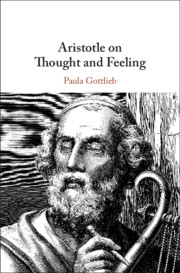Book contents
- Aristotle on Thought and Feeling
- Aristotle on Thought and Feeling
- Copyright page
- Dedication
- Contents
- Acknowledgments
- Abbreviations
- Introduction
- 1 The Psyche
- 2 Aristotelian Feelings
- 3 Developing Thought and Feeling
- 4 Aristotelian Choice
- 5 Akrasia
- 6 Thoughtfulness and Feelings
- 7 To Kalon and Music
- Conclusion
- Glossary of Key Terms
- References
- General Index
- Index Locorum
5 - Akrasia
Published online by Cambridge University Press: 08 January 2021
- Aristotle on Thought and Feeling
- Aristotle on Thought and Feeling
- Copyright page
- Dedication
- Contents
- Acknowledgments
- Abbreviations
- Introduction
- 1 The Psyche
- 2 Aristotelian Feelings
- 3 Developing Thought and Feeling
- 4 Aristotelian Choice
- 5 Akrasia
- 6 Thoughtfulness and Feelings
- 7 To Kalon and Music
- Conclusion
- Glossary of Key Terms
- References
- General Index
- Index Locorum
Summary
explores the phenomenon of disintegration, akrasia, in which the agent’s better judgment and appetite (classified as a feeling by Aristotle) come apart and the agent acts voluntarily simply on her appetite instead of her better judgment. Here again I rely on my account of indexical insight from , and I return to Sophocles’ Philoctetes to give a reading of the play that supports Aristotle’s claim that Neoptolemus is not akratic when he ceases to fall in with Odysseus’s plan to deceive Philoctetes, because he is not acting incorrectly. The upshot of my discussion, a detailed interpretation of the infamous EN VII 3, is that the akratic lacks the self-knowledge, the thoughtfulness, and virtue of character to act reliably in a correct manner. Contrary to the contention of modern philosophers, I argue that akrasia is primarily an ethical phenomenon.
- Type
- Chapter
- Information
- Aristotle on Thought and Feeling , pp. 81 - 103Publisher: Cambridge University PressPrint publication year: 2021

